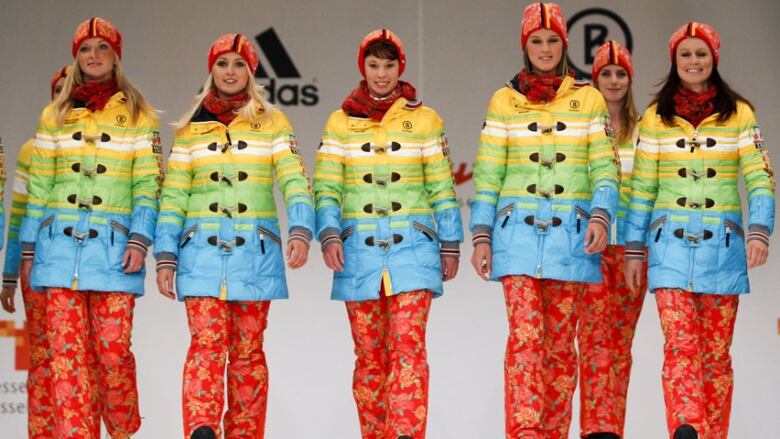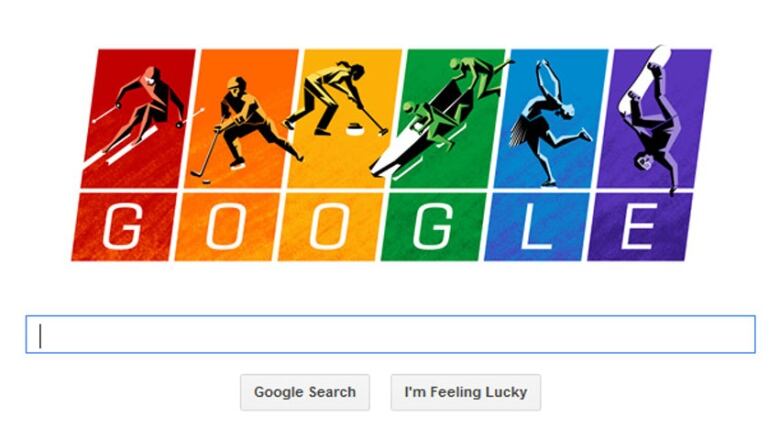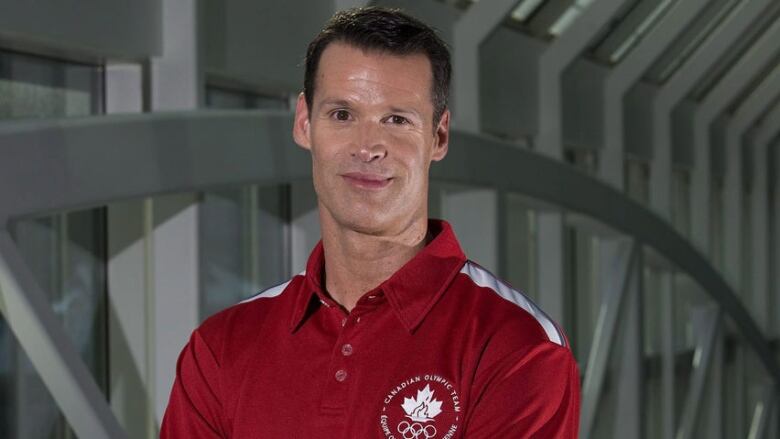Could these be the gayest Olympics ever?
LGBT rights, sexual identity at forefront of Games despite Russia's attempt to silence activism
A rainbow-inspired Google Doodle. Openly gay delegates sent to Sochi by foreign governments. A viral PSA promoting inclusiveness of LGBT athletes.
This could be adding up to be the most LGBT-conscious Games in history, says former gold-medal Olympic swimmer and openly gay athlete Mark Tewksbury.
"I don't know if it's a watershed moment, but it's certainly a bit of a tipping point. It shows that the world as I knew it back in 1992 as a closeted athlete has changed," he said.

If it wasn't already clear from global press images of demonstrators hoisting signs depicting President Vladimir Putin in drag, the 2014 Sochi Winter Games has been unable to shake the gay-rights controversy.
The uproar was also Russia's own doing, stemming from the country's passage of legislation last June to punish people for the spread of homosexual "propaganda." The law drew condemnation around the world for being vague and stigmatizing gay identity.
"Sometimes things backfire," Tewksbury said. "Trying to make this a non-issue, well, guess what it's a huge issue."
This will absolutely be the Games where everyone is talking about sexual orientation and gender identity- Helen Kennedy, executive director of
Referring to Sochi mayor Anatoly Pakhomov's declaration to the BBC that his coastal town has no gay residents, Tewksbury said, "You cannot tell me there wasn't a single gay person in that opening ceremony."
Commentators already pointed out the use of gaycomposer Tchaikovsky's music during the show, as well as a performance from faux-lesbian singing duo t.A.T.u.
Tewksbury noted it was unusual for an International Olympic Committee president to make political overtures at an Olympic opening ceremony. He was surprised, then, when the IOC's Thomas Bach seemed to address the controversy over Russia's anti-gay laws during his remarksat Sochi's Fisht Olympic Stadium.
Gay delegates
"While not speaking explicitly to LGBT issues, he used words like 'diversity,' 'unity,' and spoke about respecting each other's differences on and off the playing field," Tewksbury said.
The moment was "unprecedented," he added.
In the lead-up to the Games, some protesters called for their nations to boycott the event on discrimination grounds.
- Sochi opening ceremony can't avoid anti-gay law controversy
- Gay snowboarder Cheryl Maas rocks rainbow glove in Sochi
- 4 gay activists arrested by Russians as Sochi Games open
France and Germany declined to send their leaders to Sochi while U.S. President Barack Obama chose two homosexual delegates tennis champ Billie Jean King and hockey medallist Caitlin Cahow to represent the United States. (King will not be attending Sochi, however, because her mother passed away on Friday.)

Vancouver opted to send openly gay councillor Tim Stevenson to represent the city in Sochi.
"You look around Canada today and there's municipalities flying rainbow flags all over in support of the LGBT population," said Helen Kennedy, executive director of gale Canada, a charity promoting LGBT rights.
- Rainbow flag flies above Montreal City Hall for Sochi Games
- Big Olympic sponsors tread softly around Russia's anti-gay law
Toronto had its own minor flag flap on Friday when mayor Rob Ford tried to have city hall take downa rainbow flag that had been raised. He eventuallylost the fight to have the flagremoved.
'The Games have always been a little bit gay'
Dutch snowboarder Cheryl Maas wore a rainbow-adorned glove on Thursday. And when Germany unveiled its rainbow-striped uniforms in October, the colourful duds were immediately interpreted aspushback against Russia's laws, though a German Olympic official insisted they were just intended to be fashionable.

One way or the other, the reality is LGBT issues are now entwined withtheSochiWinter Games, said Michael Bach, founder and CEO of the Toronto-based Canadian Institute of Diversity and Inclusion.
"This will absolutely be the Games where everyone is talking about sexual orientation and gender identity," he said.
"It won't surprise me if, standing on the podium, somebody holds up a rainbow flag or holds hands with a same-gendered person."
Last week, the CIDI released a 30-second spot showing a two-man luge team thrusting back and forth before racing their sled down a track an advert that has already logged more than threemillion hits on YouTube.
"The Games have always been a little bit gay," the commercial's tagline reads. "Let's fight to keep them that way."
'Dark cloud'
While the showings of global support for gay rights have been welcomed by the community, Kennedy, with gale Canada, said it's unfortunate that the attention on human rights has had to overshadow the world's leading international sporting event.
"It really has in my view put a big dark cloud over the Olympics," she said.
On Friday, four gay activists were arrested in St. Petersburg for unfurling a banner quoting the Olympic Charter's message about sport free of "discrimination of any kind."
Human Rights Watch posted footage to YouTube last week showingLGBTpeople and activists in Russia being assaulted and threatened in public.
"I worry primarily for what's going to happen after the Games for the LGBT people left behind in Russia after the Games, because things will not improve, they will deteriorate," Kennedy said.
"It's pretty sad to think that we have to wait for an Olympics to shine a light on human-rights violations that are so violent."












_(720p).jpg)


 OFFICIAL HD MUSIC VIDEO.jpg)
.jpg)



























































































